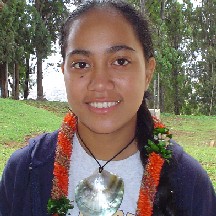Digital Collections
Celebrating the breadth and depth of Hawaiian knowledge. Amplifying Pacific voices of resiliency and hope. Recording the wisdom of past and present to help shape our future.
Camille Naluai, interviewer [Ka‘iwakīloumoku]
January 2004
Sapeta Taito, a 17-year-old from the island of Rotuma, plays the lead role in one of the most talked about films at the 2004 Sundance Film Festival. Taito stars in Te Maka Production’s The Land has Eyes. The 90-minute film tells the story of Viki, a young Rotuman who restores her family’s honor by exposing the secrets of the island’s most powerful people. Taito visited Kamehameha Schools Kapālama campus the day before she was to return back home to Rotuma.
CN: How old are you?
ST: I’m 17 years old and will be 18 in July.
CN: Where are you from?
ST: I’m from the island called Rotuma which is part of Fiji. Fiji and Rotuma were once a colony of Great Britain and we gained our independence in the year 1970.
CN: What movie are you in?
ST: I am in the movie, The Land has Eyes, basically it’s a saying for the Rotumans like the land has eyes, and teeth and knows what is right. So, if you do something unjustly or secretly that is wrong somehow it’s going to show up.
CN: How do you relate to your character?
ST: It was kind of similar. I really worked hard in school to be educated and to win the scholarship to go to Fiji. So, it wasn’t hard playing the character because the character seems to be very Rotuman.
CN: What are some similarities between Hawai‘i and Fiji?
ST: People are friendly. Fijian people are friendly, the Hawaiians are friendly. And people work hard. There are always traffic jams everyday.
CN: Is the Rotuman culture strong?
ST: Yes it is strong. On the island of Rotuma it is really strong there. We learn our culture in school and we learn the language in school but we also learn English.
CN: So, everyone learns about their culture and it’s something you live? Your parents, grandparents?
ST: Yeah! We know our culture. Like for special occasions if you go over seas for the first time and when you come back they have to perform a ceremony. Like to dry you because you have been traveling so far.
CN: I know you’re only 17 right now but when you become like 25 do you want to go to Hollywood and become an actress?
ST: I think I can answer that when I’m 25.
CN: What do want to be?
ST: I’m a science student. I want to be a doctor.
CN: Are you going to go to school in the United States?
ST: Maybe if I have the chance or get a scholarship. Maybe.
CN: What did it take for you to get that scholarship for being in the movie?
ST: The Rotuma Island council was offering a scholarship for the best student of the school to go to Fiji and further their education and then be in the movie. I was the one who won the scholarship. I got interviewed there in the movie too.
CN: How do you like Hawai‘i so far?
ST: I really like Hawai‘i. It’s nice. It reminds me of Rotuma with the beaches and the water.
CN: Tell me about Rotuma?
ST: Rotuma is, I’m not really sure whether it’s 300 or 400 miles north of Fiji and it is 9 miles by 2 miles and it consists of about 2,500 people. The dominant language there is Rotuman. You would only speak English to those people who don’t understand Rotuman or in school or at work. But, mostly at home and special occasions, everything is done in Rotuman.
CN: Are there tourists in Rotuma?
ST: Oh no! We don’t have tourists in Rotuma. But, I think it’s good because the island is so small.
CN: What is the Island’s major form of commerce?
ST: The major source of income for the people is cutting copra. And then dry it and sell it.
CN: Thank you for talking story with me today.
ST: Thank you.

Sapeta Taito